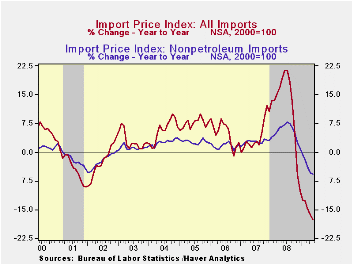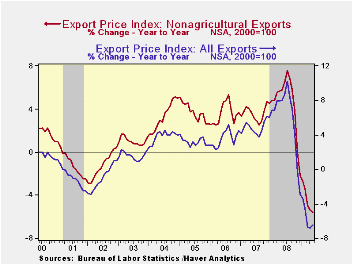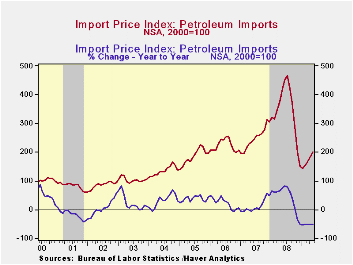 Global| Jun 12 2009
Global| Jun 12 2009U.S. Import Prices Rise With Higher Oil Prices
by:Tom Moeller
|in:Economy in Brief
Summary
During May, U.S. import prices moved higher again due to recent increases in oil prices The expected 1.3% gain followed a similar 1.1% rise during April and, since January, prices have risen by 2.9%. Nevertheless, earlier declines in [...]
 During May, U.S. import prices moved higher again due to recent
increases in oil prices The expected 1.3% gain followed a similar 1.1%
rise during April and, since January, prices have risen by 2.9%.
Nevertheless, earlier declines in prices were severe with the start of
the global economic recession. Therefore the y/y change in import
prices remained a negative 17.6%.
During May, U.S. import prices moved higher again due to recent
increases in oil prices The expected 1.3% gain followed a similar 1.1%
rise during April and, since January, prices have risen by 2.9%.
Nevertheless, earlier declines in prices were severe with the start of
the global economic recession. Therefore the y/y change in import
prices remained a negative 17.6%.
Higher petroleum prices have accelerated recent import price gains. The 8.3% increase last month was the fourth firm consecutive monthly rise and another strong gain is in store for this month. The price for a barrel of Brent Crude oil yesterday rose to $71.55. That's up nearly seven dollars, or ten percent, from the end of May. Crude oil prices have returned to where they were last October.
Non-oil import prices have firmed as
well, though nowhere near as dramatically as oil. The lower value of
the dollar as well as a firming U.S. economy undoubtedly were behind
the 0.2% price uptick in May which left prices roughly flat over the
last three months.  While not strong, by any means, the stability
compares to three-month price declines of 3.5% as recently as this past
January. (During the last ten years, there has been a negative 81%
correlation between the nominal trade-weighted exchange value of the US
dollar vs. major currencies and the y/y change in non-oil import
prices.)
While not strong, by any means, the stability
compares to three-month price declines of 3.5% as recently as this past
January. (During the last ten years, there has been a negative 81%
correlation between the nominal trade-weighted exchange value of the US
dollar vs. major currencies and the y/y change in non-oil import
prices.)
During May, capital goods import prices were unchanged after a 0.1% uptick during April. On a three-month basis, prices fell 0.3% after the 0.9% decline during March. Excluding computers, capital goods prices were unchanged in May and three-month growth remained a low -0.4%. Prices of computers, peripherals & accessories rose 0.2% last month but they were down 0.3% during the last three months. Regardless of that firming, computer prices remained 6.4% lower than last year.
Prices for nonauto consumer goods were unchanged in
May, but here again there has been some firming versus earlier
declines. The three-month rate of change amounted to -0.2% which
compared to a -0.7% change as recently as January. Durable consumer
goods prices rose 0.4% over the last three months after a -1.7% decline
through January. Household goods and home entertainment equipment
prices have firmed considerably. Moving the other way, declines in
apparel prices have offset some of that strength in durables.
Moving the other way, declines in
apparel prices have offset some of that strength in durables.
Total export prices have firmed and accompanied the gains in import prices. Last month they rose 0.6% led by a 3.6% (-14.7% y/y) rise in agricultural prices. Nonagricultural export prices also have firmed but not to the same degree. Last month they rose 0.3% and over three months they were up just 0.1% following a -6.0% decline as of the end of last year.
The import and export price series can be found in Haver's USECON database. Detailed figures are available in the USINT database.
Risks and Resolutions: The "Day After" for Financial Institutions - A Conference Summary from the Federal Reserve Bank of Chicago can be found here.
| Import/Export Prices (NSA, %) | May | April | Y/Y | 2008 | 2007 | 2006 |
|---|---|---|---|---|---|---|
| Import - All Commodities | 1.3 | 1.1 | -17.6 | 11.5 | 4.2 | 4.9 |
| Petroleum | 8.3 | 9.8 | -51.4 | 37.7 | 11.6 | 20.6 |
| Nonpetroleum | 0.2 | -0.2 | -5.8 | 5.3 | 2.7 | 1.7 |
| Export - All Commodities | 0.6 | 0.4 | -6.5 | 6.0 | 4.9 | 3.6 |
Tom Moeller
AuthorMore in Author Profile »Prior to joining Haver Analytics in 2000, Mr. Moeller worked as the Economist at Chancellor Capital Management from 1985 to 1999. There, he developed comprehensive economic forecasts and interpreted economic data for equity and fixed income portfolio managers. Also at Chancellor, Mr. Moeller worked as an equity analyst and was responsible for researching and rating companies in the economically sensitive automobile and housing industries for investment in Chancellor’s equity portfolio. Prior to joining Chancellor, Mr. Moeller was an Economist at Citibank from 1979 to 1984. He also analyzed pricing behavior in the metals industry for the Council on Wage and Price Stability in Washington, D.C. In 1999, Mr. Moeller received the award for most accurate forecast from the Forecasters' Club of New York. From 1990 to 1992 he was President of the New York Association for Business Economists. Mr. Moeller earned an M.B.A. in Finance from Fordham University, where he graduated in 1987. He holds a Bachelor of Arts in Economics from George Washington University.






